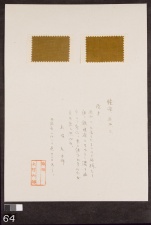Difference between revisions of "Harikawa (Japanese Alder) - right (64 R)"
Jump to navigation
Jump to search
(username removed) |
m (MDerrick moved page Harikawa - right (64 R) to Harikawa (Japanese Alder) - right (64 R) without leaving a redirect) |
||
| (2 intermediate revisions by one other user not shown) | |||
| Line 5: | Line 5: | ||
| 64 | | 64 | ||
|- | |- | ||
| − | ! scope="row"| | + | ! scope="row"|Uemura number / title |
| − | | | + | | ; "Haze-some 25" |
|- | |- | ||
! scope="row"|Folder location | ! scope="row"|Folder location | ||
| Line 47: | Line 47: | ||
| 1) dye bath; 2) supernate of lime water; 3) iron mordant (small quantity); 4) dye bath; and 5) lime water. | | 1) dye bath; 2) supernate of lime water; 3) iron mordant (small quantity); 4) dye bath; and 5) lime water. | ||
|- | |- | ||
| − | ! scope="row"| | + | ! scope="row"|Uemura's notes |
| − | | The quantity of the iron mordant used was greater here; the larger the amount of iron mordant was, the more the color would shift towards black tone. Note that similar browns are found with "Tamba-cloth | + | | The quantity of the iron mordant used was greater here; the larger the amount of iron mordant was, the more the color would shift towards black tone. Note that similar browns are found with "Tamba-cloth ". |
|- | |- | ||
| − | ! scope="row"| | + | ! scope="row"|Uemura's date |
| Kyoto | | Kyoto | ||
|} | |} | ||
| − | [[Category: | + | [[Category:Uemura dye archive]] |
Latest revision as of 16:28, 22 June 2020
| Museum number | 64 |
|---|---|
| Uemura number / title | ; "Haze-some 25" |
| Folder location | 1st shelf |
| Sample location | right (64 R) |
| Fiber type | silk |
| Color | brown |
| Dyestuff (Japanese common name) | 榛皮 : Harikawa |
| Dye (English common name) | Japanese Alder |
| Dyestuff (botanical name) | Alnus japonica (Thunb.) Steud |
| Plant part | bark /dried (?) |
| Dyestuff extraction | boiled in water |
| Auxiliary agent in dye bath | - |
| Mordant | lime water (supernate); iron |
| Other auxiliary agent | - |
| Dyeing process | 1) dye bath; 2) supernate of lime water; 3) iron mordant (small quantity); 4) dye bath; and 5) lime water. |
| Uemura's notes | The quantity of the iron mordant used was greater here; the larger the amount of iron mordant was, the more the color would shift towards black tone. Note that similar browns are found with "Tamba-cloth ". |
| Uemura's date | Kyoto |
